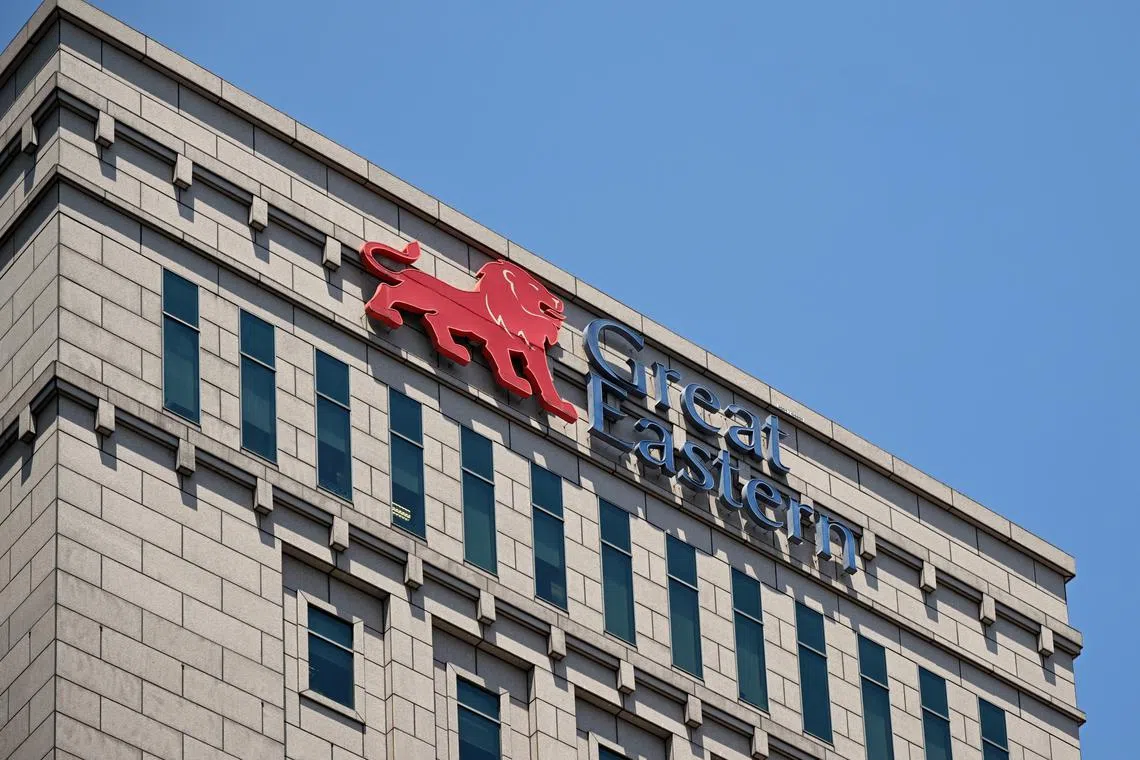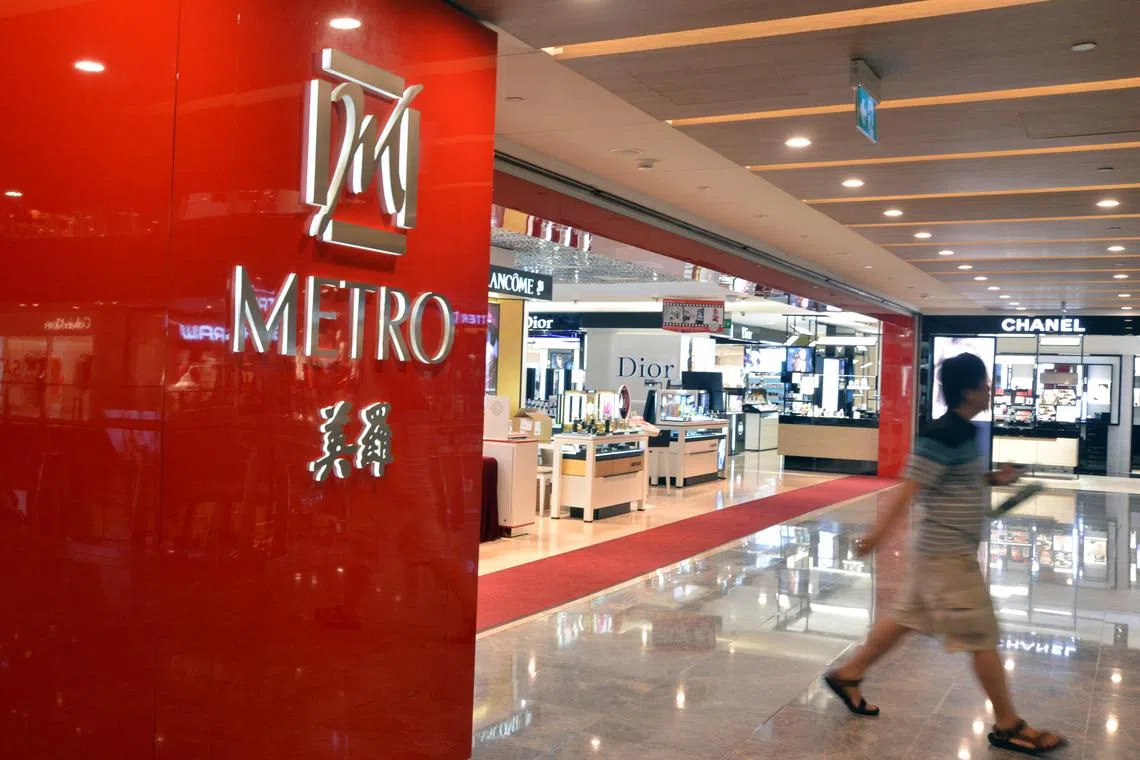Market Insights
Singtel hits five-year high; no reprieve for Yangzijiang as stock slides further
Sign up now: Get ST's newsletters delivered to your inbox

Singtel has hit more than half of its $6 billion mid-term asset recycling target and is now raising this target to $9 billion.
ST PHOTO: TARYN NG
Follow topic:
SINGAPORE - Shares of Singtel hit a five-year high of $3.99 on May 22, after the company announced it had proposed a final dividend of 10 cents per share for the financial year ended March 31.
The proposal brought total dividends for the year to 17 cents, up from 15 cents in the previous year.
Singtel also said it will buy back up to $2 billion of its shares over three years
Following its divestment of a 1.2 per cent stake in its Indian associate Bharti Airtel
The company reported a net profit of $4.02 billion for the financial year, more than five times that of the previous year. This was due to a net exceptional gain of $1.55 billion, mainly from the partial divestment of its Comcentre headquarters, compared with a net exceptional loss of $1.47 billion a year ago.
Shares of Singtel were heavily traded through the week, and closed on May 23 at $3.88.
Yangzijiang Shipbuilding continued to slide last week.
The shipbuilder’s shares have been falling ever since a US proposal to impose fees on Chinese-built vessels entering American ports was announced on Feb 21, the same day the shares hit an all-time high of $3.22.
In a business update on May 22, Yangzijiang reported securing only six new ship orders worth US$290 million (S$372 million) in the first quarter of 2025 – less than 5 per cent of its US$6 billion annual target. The company attributed the slowdown to ship owners holding back amid uncertainty over US port fees.
Yangzijiang also noted that it remains on track to deliver its targeted 56 vessels in 2025 and holds an order book valued at US$23.2 billion, with deliveries scheduled over the next three years.
Nevertheless, its shares fell by more than 6 per cent through the week, closing on May 23 at $2.06.
Thakral jumps on possible IPO of Australia associate
Shares of Thakral Corporation jumped by more than 16 per cent to $1 on May 23, after providing an update on its associate company, GemLife, an over-50s lifestyle resorts business in Australia in which it holds a 31.7 per cent effective stake.
Thakral said GemLife has made progress in evaluating its future growth options, including a potential initial public offering (IPO).
The update follows an April 7 exchange filing, in which Thakral issued a clarification in response to an article published by the Australian Financial Review on April 2. The article had said that GemLife’s owners have appointed financial advisers as well as representatives to arrange introductory meetings with investors as they explore a potential IPO.
Thakral stated then that while introductory meetings with investors are being planned regarding GemLife, there is no certainty that any transaction will take place.
In its first-quarter business update on May 19, Thakral, which invests in real estate and lifestyle brands, revealed that its revenue for the period had risen by 26.6 per cent year on year to $76 million.
Meanwhile, its profit before tax was up 27.6 per cent to $6.3 million over the period, thanks to higher profit contributions from GemLife, which completed 58 new homes in its resorts during the quarter, taking the number of occupied homes it operates to 1,862 as at March 31.
Great Eastern gets more time to restore its free float
Insurer Great Eastern Holdings said on May 23 that it has been granted a third extension of time
The insurer now has until June 8 to announce its finalised proposal to comply with the rules and will issue an announcement on the matter “no later” than that.
Great Eastern noted in its stock exchange filing that it has been exploring various options to formulate a proposal that meets the minimum 10 per cent free float requirement and addresses the interests of stakeholders. It added that it has made “significant progress” on that front.
Shares of Great Eastern have been suspended from trading since July 2024, after the company lost its free float following a takeover bid by its majority shareholder OCBC Bank.
OCBC in May 2024 made a $1.4 billion voluntary unconditional general offer
Some minority shareholders, who say OCBC’s offer price for Great Eastern of $25.60 per share is below what the insurer is worth, have refused to sell their shares. They have also noted an independent financial adviser’s opinion that the offer, while reasonable, is nevertheless unfair.

Great Eastern Holdings has been granted a third extension of time to comply with free float requirements under Singapore Exchange listing rules.
ST PHOTO: KUA CHEE SIONG
Meanwhile, chief executive of Cosmosteel Holdings Ong Tong Hai has been purchasing shares of the steel company in the open market.
Between May 20 and May 23, Mr Ong purchased around 6.4 million Cosmosteel shares, raising his stake in the company to 16.98 per cent.
Notably, at 21.87 cents to 22 cents each, the price paid by Mr Ong for the shares is higher than an ongoing offer of 20 cents per share made by an entity called 3HA Capital.
3HA Capital comprises parties including Hanwa Singapore, a subsidiary of Tokyo-listed steel trader Hanwa Co, which is Cosmosteel’s single largest shareholder with a 31.61 per cent stake.
While 3HA Capital’s offer price of 20 cents is 48.1 per cent higher than Cosmosteel’s share price of 13.5 cents on May 14, it is still a discount to the company’s net asset value per share of 29.31 cents as at March 31.
3HA Capital has said that it plans to continue to develop and grow Cosmosteel’s existing businesses and keep the company listed. However, if it receives more than 90 per cent of Cosmosteel’s shares, it might then exercise the right to compulsorily acquire the remaining shares and delist the company.
Other market movers
Shares of Metro Holdings, which had initially surged at the start of the week, fell 1.2 per cent to close at 41 cents on May 23, after the real estate investment company reported losses for the year ended March 31

Metro Holdings reported losses for the year ended March 31.
PHOTO: ST FILE
Metro reported a loss after tax of $224.7 million for the period compared with a profit of $14.6 million in the previous year, due to reductions in the value of its property portfolio in China, where the economy continued to experience a downturn.
Group revenue, which was mainly generated by sales at the Metro Paragon and Metro Causeway Point department stores in Singapore, fell by almost 10 per cent year on year to $104.5 million.
As a result, the retail division reported a loss after tax of $6.9 million for the year compared with a profit of $1.8 million in the previous year, amid challenges confronting Singapore’s retail sector, Metro CEO Yip Hoong Mun said.
Shares of Food Empire continued to rise last week. They reached a five-year high of $1.80 on May 20, before closing the week at $1.77.
Analysts have turned bullish on Food Empire since the company announced on May 13 higher revenues for the first quarter, driven by strong sales of its instant coffee products in Vietnam.
In contrast, they are now less bullish over Thai Beverage, whose shares have lost value due to weaker margins and consumer sentiment in recent years. They closed last week at 46 cents, down by more than 2 per cent.
What to look out for this week
Shares of Sats could see some trading activity this week, after the company reported on May 23 after the market closed a net profit of $243.8 million for the year ended March 31
The company saw its profit rising by more than four times from a year ago, thanks to “notable customer wins across (Sats’) network, including multiple new cargo and ground handling contracts secured with key customers such as Air India, Emirates and DHL in major airports”, CEO Kerry Mok said.


